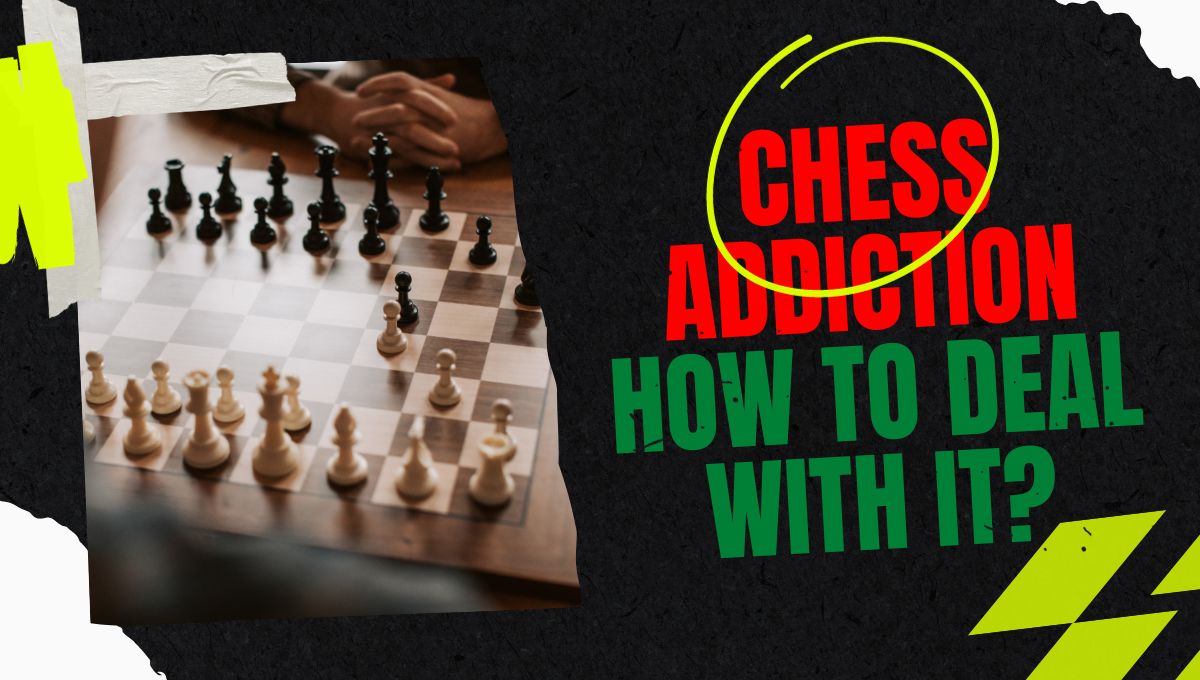Here’s your rewritten and polished version of the article, with clearer structure, better flow, and improved readability. I’ve also addressed inaccuracies and added balance where needed:
What Is Chess Addiction? | How To Deal With It | A Detailed Guide
Chess addiction is when a person becomes compulsively attached to playing chess, often to the point where it starts to interfere with other important areas of life—like work, relationships, or health. While chess is generally a positive and intellectually stimulating hobby, anything done in excess can turn problematic.
If you’ve ever caught yourself wondering, “Is this game taking too much of my time?” or “Could I be doing something more productive right now?”—you’re not alone.
The good news? You don’t have to quit chess altogether. With the right strategies, you can maintain a healthy balance and enjoy the game without letting it control your life.
Why Is Chess So Addictive?
Chess can be incredibly addictive—and for good reason:
- It offers a mental challenge that’s deeply satisfying.
- The thrill of outsmarting an opponent gives an emotional high.
- There’s always something new to learn, which keeps you coming back.
- It doesn’t depend on luck—so success feels entirely earned.
- It’s accessible to all ages and backgrounds.
The deeper you get into the game, the more you realize its complexity. What starts as a simple hobby can evolve into a full-blown obsession, especially with the rise of online platforms and chess influencers making the game more appealing than ever.
How To Overcome Chess Addiction
If chess has started to consume too much of your time or attention, here are some practical ways to regain control:
1. Set Physical Anchors
After every online game, do 5 pushups or some other quick physical activity. This helps break the cycle of back-to-back games and adds a health benefit.
2. Find a Substitute Hobby
Pick up a new interest—ideally something physical or social, like a sport, musical instrument, or creative hobby. Diversifying your interests naturally reduces your dependency on any one activity.
3. Delay the Urge
When you feel the urge to play, wait 10–15 minutes. Use that time to do something else—walk, read, or stretch. Often, the craving will pass.
4. Replace the Reward
Think about what chess gives you: a dopamine hit, a sense of achievement, or mental stimulation. Find alternative ways to get that same reward—such as puzzles, reading strategy books, or goal-setting apps.
5. Limit Your Screen Time
If you mostly play online, use screen time limits or app blockers to restrict how much time you can spend on chess platforms.
Why Does Chess Linger in Your Mind?
Chess engages your full attention, which is why it’s hard to “turn off” even after a game ends. When your brain is constantly focused on one thing, it becomes a dominant thought—even when you’re with people or doing other activities.
Magnus Carlsen and Hikaru Nakamura, two of the world’s top players, have both spoken about how chess can take over your thoughts. You can check out their insights in this video:
Why It’s Important to Control Chess Addiction
For most people, chess is a hobby—not a career. And like any hobby, it should enhance your life, not disrupt it.
Uncontrolled addiction can:
- Drain your time and energy
- Lead to social isolation
- Affect your mental health
- Make you lose interest in other important life goals
If you find yourself constantly thinking about openings, endgames, or rating points—even when you’re supposed to be focusing on work, school, or family—it might be time to reassess your relationship with the game.
Negative Effects of Playing Too Much Chess
Even good things become harmful when overdone. Some of the downsides of excessive chess play include:
- Time Mismanagement: Spending hours on chess can take time away from studies, work, or relationships.
- Mental Fatigue: Constant strategizing without breaks can lead to burnout or anxiety.
- Social Withdrawal: Too much solo chess can increase isolation, especially if you’re avoiding social interaction.
- Unrealistic Goals: Trying to “make it” as a professional can cause stress if it’s not a feasible path for you.
- Obsession: Fixating on improvement and ratings can create a toxic mindset around performance and self-worth.
In rare cases, extreme chess obsession has been linked to introversion and compulsive behavior, sometimes contributing to depression if not addressed.
Is Chess a Useless Game?
Absolutely not.
Chess offers countless benefits:
- It strengthens memory and concentration.
- It improves strategic thinking and planning.
- It boosts creativity and problem-solving skills.
Just like any other sport or game, not everyone can turn it into a career—but that doesn’t make it useless. For most people, chess is a valuable mental workout and a fun way to challenge themselves.
If you’re short on time, try faster formats like blitz (3 minutes) or bullet (1 minute) games. They offer the same thrill in a shorter time frame.
Chess only becomes a waste of time when it overtakes more meaningful or necessary parts of your life.
Final Thoughts
Chess addiction isn’t a serious problem for most people—but it can become one if not handled mindfully. To keep things in balance, parents and players alike should ensure that chess is part of a broader, well-rounded lifestyle.
The key is moderation. Chess should serve as a stimulating, enjoyable part of your day—not the only part.
Related Articles:
If you found this guide helpful, feel free to share it on social media to help others develop a healthy and enjoyable relationship with chess!
